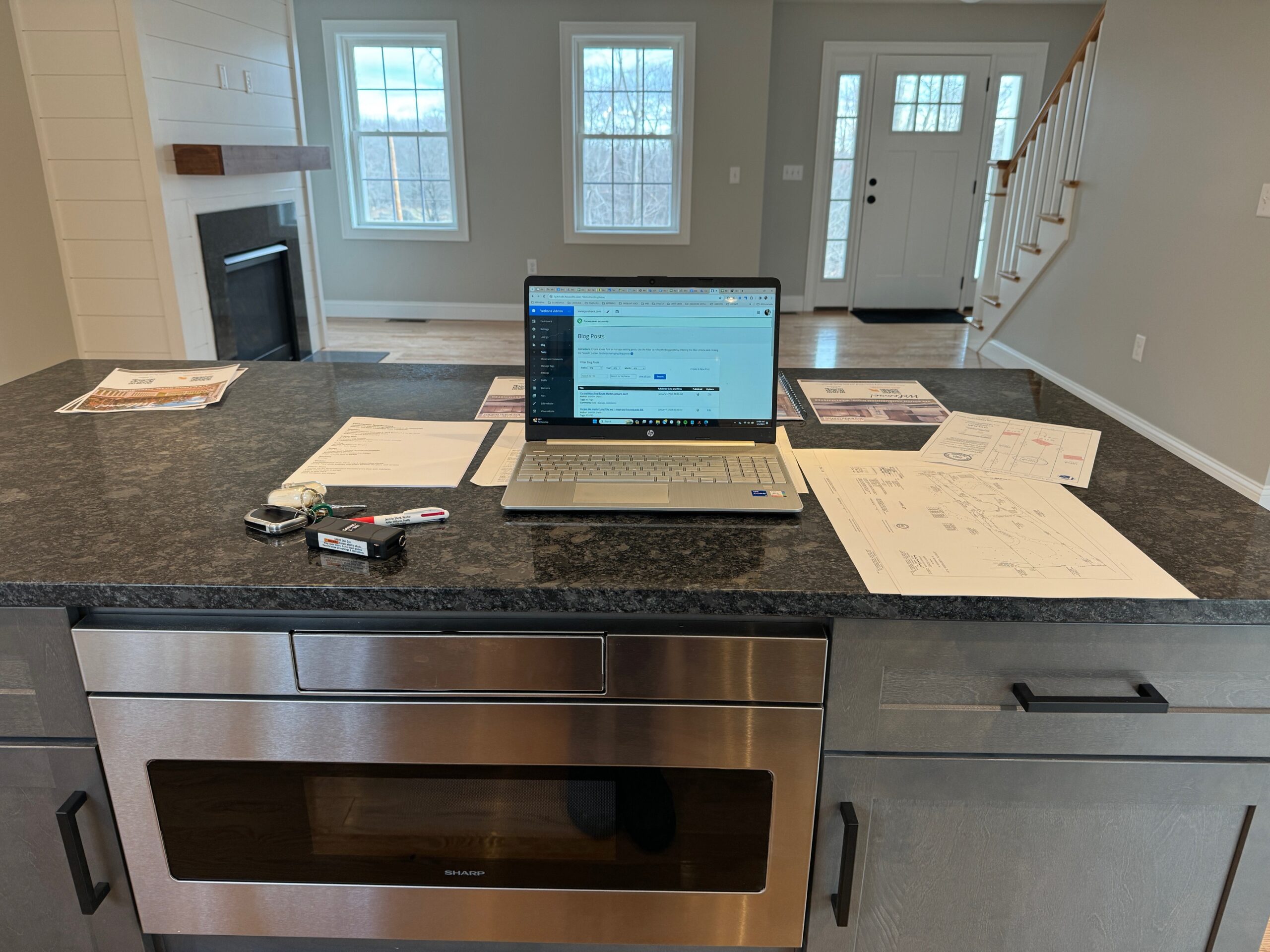
Here’s the state of the Central Massachusetts Real Estate market, as of New Year’s Day, 1/1/2024. And what a year we’ve just had. The photo above is real-time as I’m writing this story, not to brag that I’m working on the holiday, but as an indicator of the confidence I have in the local real estate market–I have three showings today, which tells me one big thing~~there’s a large pool of buyers who believe (and I believe it, too) that when rates go down any further, the buyer demand will create more competition for those buyers willing to be out on the first morning of the new year. My first showing this morning was a family who brought their three young daughters along for an 8:30am showing (time was definitely at their convenience, not mine).
The three big drivers of the housing market in our area have been, and continue to be, interest rates (because they affect your monthly payment), the supply of houses for sale (there is a shortage in our area), and the amount of qualified buyers looking for homes (how many people are in the market to buy a home). These three factors are interrelated, and push the market in different directions.
Mortgage rates are high here, just like everywhere else in the United States, because inflation was and continues to be high, although it has moderated somewhat lately (the Fed raised interest rates to fight inflation, because higher interest rates slow down the economy, particularly for consumers, who then can’t afford to borrow as much). Sort of a crummy way to fight inflation, if you ask me, but it works. Look at the interest rates on credit cards (which are borderline usurious)–if you can’t make your monthly payment, you can’t buy anything.
These high interest rates really affected mortgages: In January of 2022 mortgage interest rates were about 3%, but by October of that year they’d reached over 7%. In January of 2023 they “fell” to around 6%, only to rise again to nearly 8% in November of 2023, with a slight decline in December to around 7%. Given that 2024 is a big election year, it’s likely that mortgage interest rates will continue to moderate a bit, unless inflation comes roaring back.
However, since our area is considered scenic, uncrowded, safe, and is generally seen as a great place to live and raise a family, demand for housing here is still very high. And, believe it or not, housing prices here still look like bargains if you’re coming from closer to Boston (or somewhere like California).
So high interest rates should “theoretically” cause home prices to fall, since fewer families can afford mortgages at the higher rates, but that’s not what’s happening, because the two other factors are more important. There continues to be a shortage of homes for sale, and there are still enough qualified buyers out there to bid up prices on the reduced amount of homes for sale.
This reduced supply of homes is partially thanks to these high interest rate mortgages coming so soon after what were historically low interest rates. Nobody wants to give up a 2.75% mortgage in this market unless they really have to, or really want to move–basically, most people aren’t selling unless they must, which really constricts supply. This shortage of homes is made even more severe because new homes cannot be built fast enough to meet demand, and when they are built, the prices are higher, since building material prices have escalated considerably, along with construction wages. Mainly though, there simply isn’t enough buildable land available, for the same reasons that this area is so nice to live in–zoning, lots of protected land, and land that is too wet, inaccessible, or simply too expensive to build on.
So what’s a person to do? Well, if you want to sell or have to sell, it’s still a good time to do so, but keep in mind that if it’s your home you’re selling (not an estate sale), you’ll still have to live somewhere, and possibly buy in a tight market. If you are not a “cash buyer”, then you have high interest rates to deal with as well.
If you’re buying? My advice is still the same–a mortgage beats paying rent. A higher rate means you’ll be paying more to buy your home, but rent means that you are not buying a home at any price. Paying rent accomplishes the same as if your mortgage rate was 100%–absolutely nothing goes to principal, ever. Just make sure you deal with a good mortgage broker/company/bank, and that you have options like the ability to refinance. These rates probably won’t last forever. Sometimes you can even ‘buy down’ your rate.
Buying or selling, and I’m not just saying this because I’m a realtor, but it is extremely important to work with an excellent realtor. There aren’t a lot of barriers to becoming a realtor–you just have to pass a test and pay dues, but it’s exceptionally hard to become a successful realtor. There is so much to know and understand, and you really only learn by experience and by doing it over and over again, so as to gain experience and be able to troubleshoot complex situations. If you are buying, work with someone who is honest, experienced, and knows the local area well. You don’t want to buy your dream home and find out a few months later that it was built on the site of an abandoned asbestos factory, and you want someone who will negotiate intelligently on your behalf. If you are selling, work with someone who is honest, experienced, highly respected, knows how to market, has connections in the real estate market, and will go the extra mile to help you get top top dollar from your sale. As just a silly but very real example, if your home has dirty or mismatched light switch plates, clean them or buy new ones. It’s cheap money, and people don’t necessarily buy homes logically. They want a home that “sings to them”. Dirty switch plates can’t carry a tune.
If you want to learn about the national real estate market, there are websites that do a decent job of providing facts that apply nationwide, which are interesting, but don’t actually have much to do with the local market here in Worcester County. The fact that Chicago, Detroit, and many cities in California are experiencing declining prices has virtually nothing to do with prices here in Westminster, Holden, Princeton, or Ashburnham, and Worcester County in general, except of course if the people fleeing those areas move here.
Since this is the last ‘state of the real estate market’ story of 2023, here’s a quick note on the court cases that revolve around ‘buyer agents’ and their commission rates. I’m not really taking sides on it, as I’m sure it’ll spend a really long time winding through the courts, but this is a missing perspective on it:
Around here, a buyer agent typically gets a 2% commission, the exact amount of which is readily visible on the Multiple Listing Service (MLS) and many commercial real estate listing syndication websites. Sometimes, as you get closer to Boston, it’s 2.5%. This of course is negotiable, but it the most common percentage that I see. The role of the buyer agent is to represent the buyer in a transaction. To make the math easy, let’s say the home sells for $400,000. At 2%, that means the buyer agent just made $8,000, which to the seller of the home seems like a whole lot of money for someone who just shows up with a buyer…which it is. But here’s the missing piece, which also seems to be missing from all the reporting on the case:
Most buyer agents don’t make much money, and the reason for that is that a buyer agent has to show potential buyers a whole lot of homes for free before he or she makes any money, and if their client finally does find a home they like, at an attractive price, then the buyer agent has to create an offer than competes against all the other buyer agents whose clients also like the house. If the offer from this particular buyer agent is accepted, then he makes that $8,000; but in a tight market like this one, with a lot of other buyers competing, it’s still likely the buyer agent will make $0 again. In other words, a buyer agent can go months without an accepted offer, making nothing in return for a lot of work. It’s important to note, too, that this $8,000 is before any expenses like broker splits (which can take anywhere from 10% – 50% off the top), and additional expenses like wear and tear on their vehicles, technology, association dues, TAXES, etc. as well as a significant amount of TIME. And while some buyers fall in love and offer competitively on the first house they see, others take dozens of houses to find and secure home sweet home. We have a buyer closing next month and Lisa has shown her probably in excess of 50 houses over the past three years before they found ‘the one’.
I’m not sure what the right answer is, but the problem is clear–-the seller is just selling one house, and he just paid out a lot of money for what, from his perspective, looked to him like very little work. The buyer agent, on the other hand, just spent months trying to find a suitable home for his clients, and he finally made some money. It’s a tricky situation, because someone has to show the homes to buyers, plus represent them. Normally a seller won’t just let people into their house without an accompanying agent. The basic problem is that someone has to represent people looking to buy a home, so how are they compensated? If they were to be paid hourly, it would have to be paid by the potential buyers, which really opens up a can of worms. If the buyers just represent themselves, it will dump quite a bit of work back onto the listing agent, which also creates a major conflict of interest, or they’ll have to hire a real estate attorney. It’s a tricky and interesting situation, that will probably spend years in court.



